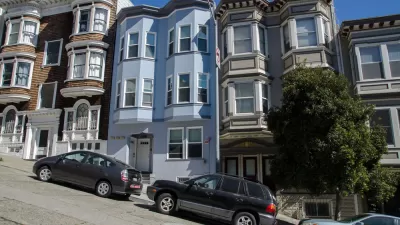A proposal under consideration by the San Francisco Board of Supervisors would eliminate parking requirements citywide.

"San Francisco is poised to become the first big U.S. city to no longer require developers to include at least some parking in their housing developments," reports Joshua Sabatini. San Francisco would follow Hartford, Connecticut—the first city to end parking minimums citywide—and Buffalo, New York, which also passed similar legislation, with a few caveats.
For the city to implement this drastic overhaul of its parking requirements, it will have to pass legislation introduced by Supervisor Jane Kim, who recently discussed the proposed legislation at a public hearing.
“It would not prohibit parking in any redevelopment. It would merely remove the requirement that a developer would have to build a minimum number of parking spaces,” Kim said during Monday’s Land Use and Transportation Committee hearing.
Kim also says that the city is already working around parking requirements for most developments.
Arielle Fleisher, a representative for public policy think tank SPUR, is also quoted in the article discussing the benefits of ending parking requirements.
“There is no good reason for the city to force the private market to produce parking spaces for every housing unit built,” said Arielle Fleisher, a representative for public policy think tank SPUR. “Eliminating minimum parking requirements reduces the cost of producing new housing and enables us to use our land more efficiently by replacing spaces for cars with spaces for people.”
More advocates are cited in the article as supporting the legislation. The full San Francisco Board of Supervisors is expected to vote on the bill next week.
FULL STORY: SF to do away with minimum parking requirements for developments

Alabama: Trump Terminates Settlements for Black Communities Harmed By Raw Sewage
Trump deemed the landmark civil rights agreement “illegal DEI and environmental justice policy.”

Planetizen Federal Action Tracker
A weekly monitor of how Trump’s orders and actions are impacting planners and planning in America.

The 120 Year Old Tiny Home Villages That Sheltered San Francisco’s Earthquake Refugees
More than a century ago, San Francisco mobilized to house thousands of residents displaced by the 1906 earthquake. Could their strategy offer a model for the present?

In Both Crashes and Crime, Public Transportation is Far Safer than Driving
Contrary to popular assumptions, public transportation has far lower crash and crime rates than automobile travel. For safer communities, improve and encourage transit travel.

Report: Zoning Reforms Should Complement Nashville’s Ambitious Transit Plan
Without reform, restrictive zoning codes will limit the impact of the city’s planned transit expansion and could exclude some of the residents who depend on transit the most.

Judge Orders Release of Frozen IRA, IIJA Funding
The decision is a victory for environmental groups who charged that freezing funds for critical infrastructure and disaster response programs caused “real and irreparable harm” to communities.
Urban Design for Planners 1: Software Tools
This six-course series explores essential urban design concepts using open source software and equips planners with the tools they need to participate fully in the urban design process.
Planning for Universal Design
Learn the tools for implementing Universal Design in planning regulations.
Clanton & Associates, Inc.
Jessamine County Fiscal Court
Institute for Housing and Urban Development Studies (IHS)
City of Grandview
Harvard GSD Executive Education
Toledo-Lucas County Plan Commissions
Salt Lake City
NYU Wagner Graduate School of Public Service





























